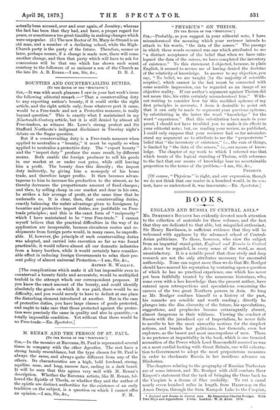BOUNTIES AND COUNTERVAILING DUTIES.
[TO THE EDITOR OF THE " SPECTITOR.1 SIR,—It was with much pleasure I saw in your last week's issue the following editorial remark :—" That a countervailing duty to any exporting nation's bounty, if it could strike the right article, and the right article only, from whatever port it came,
would be a Free-trade and not a Protective measure, is really beyond question." This is exactly what I maintained in my Nineteenth-Century article, but it is still denied by almost all Free-traders, as witness Mr. Lowe's strong protest and Sir Stafford Northcote's indignant disclaimer in Tuesday night's debate on the Sugar question.
But if a countervailing duty is a Free-trade measure when applied to neutralise a "bounty," it must be equally so when applied to neutralise a protective duty. The " export bounty " and the " import duty " produce the same result, by different means. Both enable the foreign producer to sell his goods in our market at or under cost price, while still leaving him a profit. The bounty does this directly ; the import duty indirectly, by giving him a monopoly of his home trade, and therefore larger profits. It then becomes advan- tageous to him to increase his production to the utmost, as he thereby decreases the proportionate amount of fixed charges ; and then, by selling cheap in our market and dear in his own, he strikes a fair average of profit, at the same time that he undersells us. It is clear, then, that countervailing duties, exactly balancing the unfair advantage given to foreigners by bounties and protective import duties, are justifiable on Free- trade principles ; and this is the exact form of " reciprocity " which I have maintained to be " true Free-trade." I cannot myself believe that the practical difficulties in the way of its application are insuperable, because circuitous routes and re- shipments from foreign ports would, in many cases, be unprofit- able. If, however, the principle of such countervailing duties
was adopted, and carried into execution as far as was found practicable, it would relieve almost all our domestic industries from a heavy burthen, while it would certainly have consider- able effect in inducing foreign Governments to relax their pre- sent policy of almost universal Protection.—I am, Sir, &c., ALFRED R. WALLACE.
[The complications which make it all but impossible even to
-countervail a bounty fairly and accurately, would be multiplied -tenfold in the attempt which our correspondent proposes. If you know the exact amount of the bounty, and could identify absolutely the goods on which it was paid, there would be no
difficulty, and you would merely to have to deduct at one place the disturbing element introduced at another. But in the case of protective duties, you have large classes of goods protected, and ought to take care that those protected against the protec- tion were precisely the same in quality and also in quantity,—a totally impossible condition. Yet without that there would be no Free-trade.—En. Spectator.]


































 Previous page
Previous page